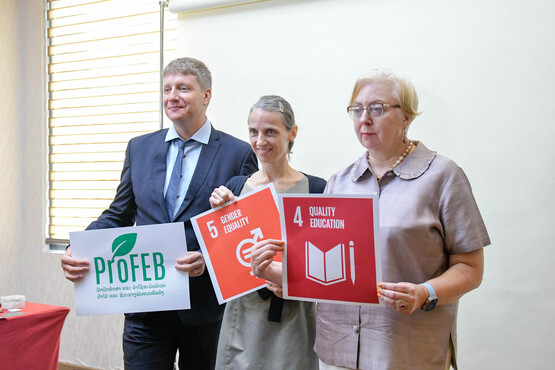Team Europe Partners with Lao PDR for Sustainable Use and Conservation of Forests

Team Europe has partnered with Laos to increase sustainable and inclusive Trade, Investment, and Connectivity in the Agriculture and Forestry sectors (TICAF). As part of this multi-donor partnership, the European Union (EU) and Germany have contributed 22 Million EUR for joint collaborative efforts with Laos to empower local communities, particularly women, in strengthened forest-based value chains for sustainable use and conservation of forests. This project will be implemented by the Deutsche Gesellschaft für Internationale Zusammenarbeit (GIZ) GmbH through the bilateral technical cooperation project "Protection and Sustainable Use of Forest Ecosystems and Biodiversity (ProFEB)."
During the stakeholder dialogue on 15 May, H.E. Dr Thongphath Vongmany, the Vice-Minister of Agriculture and Forestry, eloquently expressed, 'This partnership is a testament to our ongoing commitment and strengthened cooperation between the governments of Laos, Germany and the EU'. The Vice-Minister continued by expressing his heartfelt gratitude to the EU and Germany for their unwavering support in the conservation of forests. He further acknowledged the crucial role of the stakeholders, stating, 'Our stakeholder dialogue provides a valuable platform for open discussion on our joint efforts and collaboration, and sets the expectations for the coming years. The insights from this dialogue are instrumental in shaping our sustainability programme towards the sustainable use and conservation of forests. We are hopeful that this project will empower our local communities, particularly women, and lead to a brighter future for all.'
H.E. Ms. Ina Marčiulionytė, the EU Ambassador to Laos, emphasised, 'The EU and Laos have since cooperated in various fields in support of the socioeconomic development goals of Laos. This Action is part of a flagship programme under the Green Team Europe Initiative (TEI) for Laos to increase sustainable and inclusive trade, investment and connectivity in the agriculture and forestry sectors. The EU's support of Lao's Green Growth Strategy, through increased domestic production, processing, exports, national revenue, and decent job creation in the coffee, tea and forest-based value chains, is a testament to our commitment to greener, sustainable and more inclusive growth.'
H.E. Ms. Annette Knobloch, the German Ambassador to Laos, stated, "We are glad to see how much progress the Lao government has made in achieving the goals of sustainable management of forests, biodiversity and natural resources in the recent years. With our extended contribution to this critical project, we want to firmly anchor our successes with our partners and provide stakeholders with capacities to continue initiating sustainable processes." the German Ambassador continued: "The German government is committed to continuing the collaboration and support of the Lao Government for better framework conditions and strengthening the capacity of the Lao government, the private sector and civil society for the sustainable management of forest resources and biodiversity through technical advice by GIZ."
This joint project builds on the results of the predecessor projects of ProFEB, of which the project operationalises these foundations in each intervention area by focusing on 1). Forest Policy: Facilitating dialogues and enhancing the policy-making and legal-institutional framework for an inclusive, biodiversity-friendly and deforestation-free forestry sector; 2). Biodiversity Conservation: Empowering key actors in Laos for inter-institutional and transboundary cooperation in wildlife conservation and management of the Hin Nam No and Phong Nha-Ke Bang conservation landscape; 3). Education: Enhancing research, training, and technical capacities for the improved use and sustainable management of forest resources in Laos; 4). Forest Landscape Restauration: Building partnerships between stakeholders such as the private sector, village communities, government agencies and civil society organisations to strengthen climate-resilient restoration of forest landscapes and biodiversity conservation; and 5). Value-Chains: Establishing commercial partnerships to foster micro-, small and medium-sized enterprises for sustainable and competitive forest-based value chains.
This project's third phase commenced in January 2024 and will be implemented until March 2027.